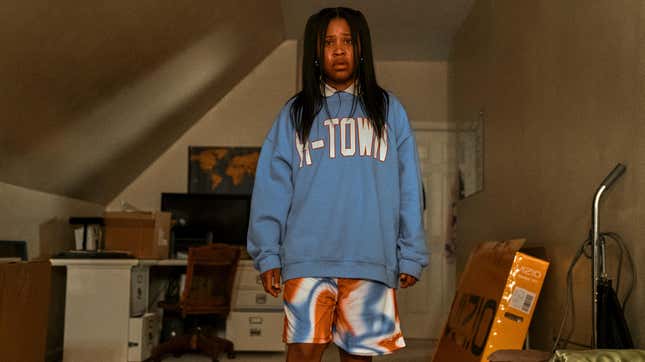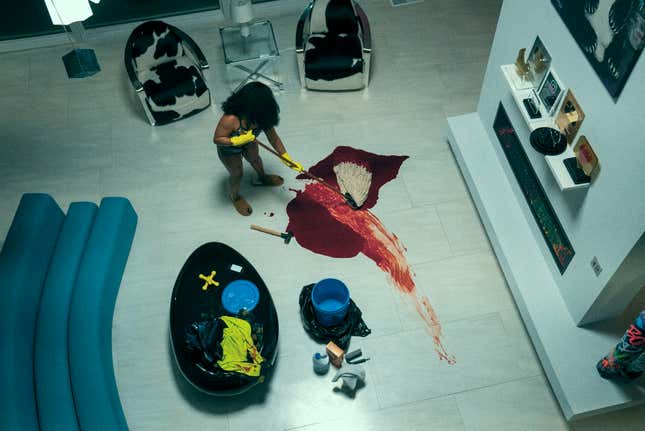
In Swarm, Prime Video’s latest psychological horror series from Atlanta scribe Janine Nabers and creator Donald Glover, Dominique Fishback stars as Dre—a crazed fan—who’s obsessed with a Ni’jah, a Beyoncé-like figure.
Inspired by a myriad of true events, we watch over the course of seven episodes as her quest to be in the orbit of Ni’jah (a journey triggered by a tragic event in the premiere episode) becomes deadlier at each turn. The show, a Black woman-led successor to Atlanta, is weird, creepy, disturbing, imperfect, messy, critical and yet not critical enough at times. Naturally, its message—or rather, the audience’s interpretation of its message—has been fodder for online discourse ever since it dropped over the weekend.
One aspect of the conversation that sticks out to me is the argument that viewers should’ve been able to humanize and/or relate to Dre at some point. Despite the killings, despite seeing her mop up blood and immediately get the munchies after. Despite her recklessness and delusions; despite her strangulations and stabbings. Despite her being quite literally a serial killer, we are somehow supposed to find a redeeming quality in this anti-hero.
And I think a part of this necessity to want to do that is due to the fact that this character, this killer, this deranged person, is a Black woman. Without giving too much away, there’s a scene in Episode Six where a real-life stan struggles to see how that devotion (read: obsession) could be taken so far as to kill someone. Killing? That’s too much. A Black woman doing the killing? That’s unimaginable. It’s a sentiment that’s prevalent throughout the entire mind-bending episode (when you watch it, you’ll understand exactly what I mean). Black women “fall through the cracks” in society as it is already. Nobody really checks for us, folks barely look out for us. So how much more would a Black woman serial killer be able to skirt by committing heinous acts?

And it’s because of this continuous overlooking and disregard that even we, as a collective audience, struggle to accept this sort of depiction on TV. When have we ever seen a completely unhinged, delusional, unforgiving, unapologetic, wholeheartedly imperfect, crazed psychotic, unrelenting, unstable Black woman character with this much brazen audacity—and very little humanistic qualities or desire for evolution—on our big or small screen? It’s unimaginable.
Dre embodies the true spirit and action of a serial killer in that she’s unfortunately unchanging in her nature and impulses. No amount of love, relationships, punishment or nurturing could fix that. That’s the entire point. And that’s OK.
You want to know why it’s OK? Because it’s all entertainment at the end of the day. Yes, I know it’s a dig at real-life, online stans and fandoms. But when you really look at it, it’s a fictionalized series about a fictional girl from Houston, obsessed with another fictional famous girl from Houston, that was created by a real-life girl from Houston. And it was created for one over-aching purpose: to entertain.
Behind the deep dives and perceived social commentary, at its core, this show is meant to entertain. And I believe that purpose often gets buried under yet another need from viewers: the need to derive meaning and message deeper from Black art that’s deeper or more profound than what’s presented. It’s a need that stems from the age-old question of whether or not Black artists can create “art for art’s sake.” Because for the Black artist, the purpose of our work is to “function within [one’s] race as a purposeful agent”—just ask Richard Wright. And to function outside of that is deemed irresponsible and irreverent.
But I can’t help but wonder if our expectation of an artist to put out work that always speaks to a larger conversation—and our expectation to always read between the lines—limits both how our art is produced and how its ingested. Can Black art and entertainment ever have the freedom to be just that—art and entertainment? Does it always have to be some deep commentary on an -ism, an ideology, or an integral part of society? Can it ever be free to exist in the space where the creator intended without it being torn apart by the audience’s own implicit perceptions and preconceived notions?
To be clear, I’m not saying artists should create irrespective of their audience. I’m also not against critical thinking and analysis. In fact, I would argue that we don’t do it anywhere near enough. I’m also not even saying we all have to like this show. But what I am saying is that maybe, just maybe, we ought to question our own obsession to find the message, what it’s trying to say, what it didn’t say, or what it should’ve said so that we don’t miss what’s actually being said—whether we agree with it or not.
Swarm, starring Dominique Fishback, Chloe Bailey, and Damson Idris, is available to stream now on Prime Video.

